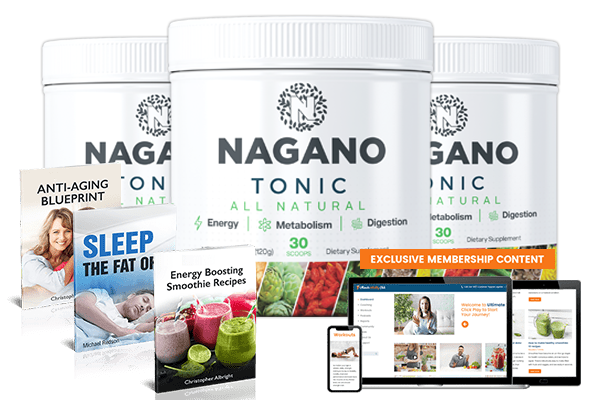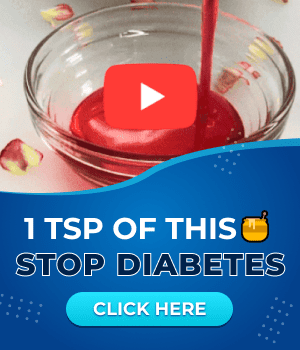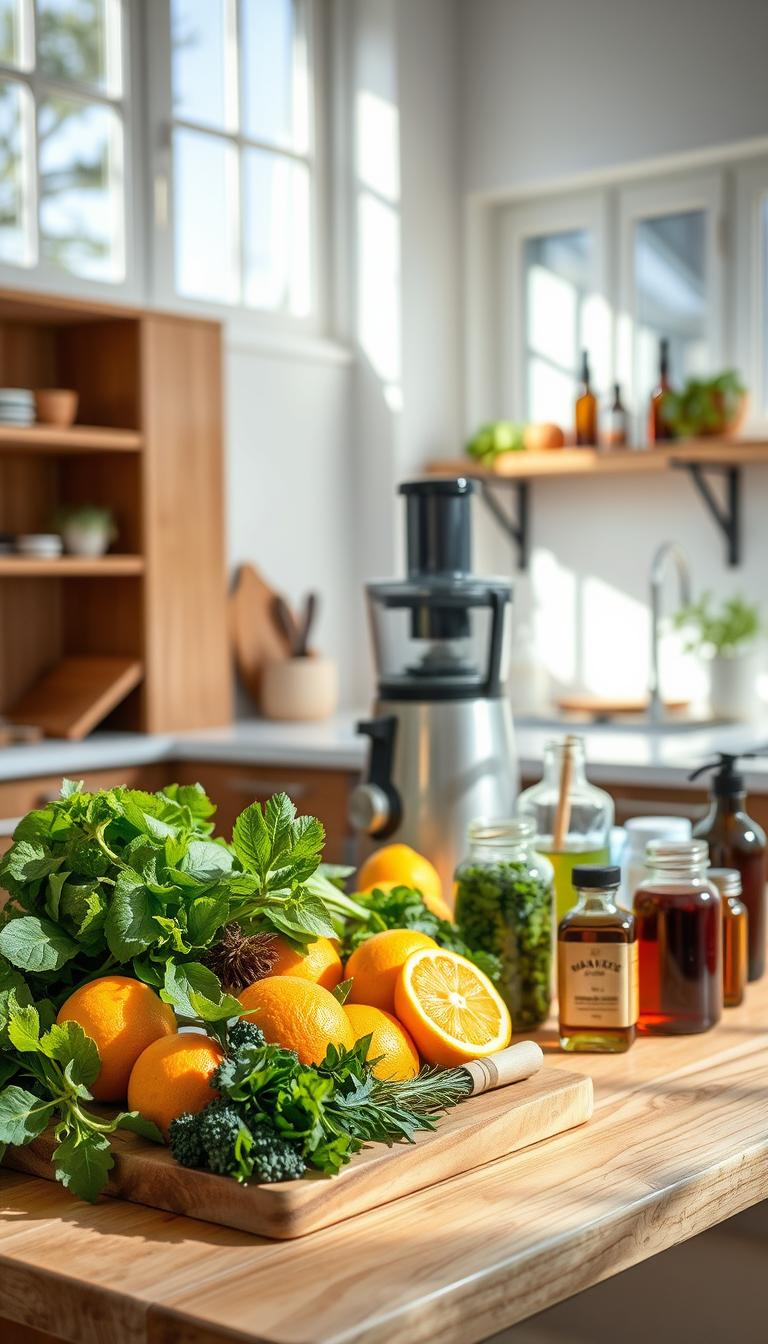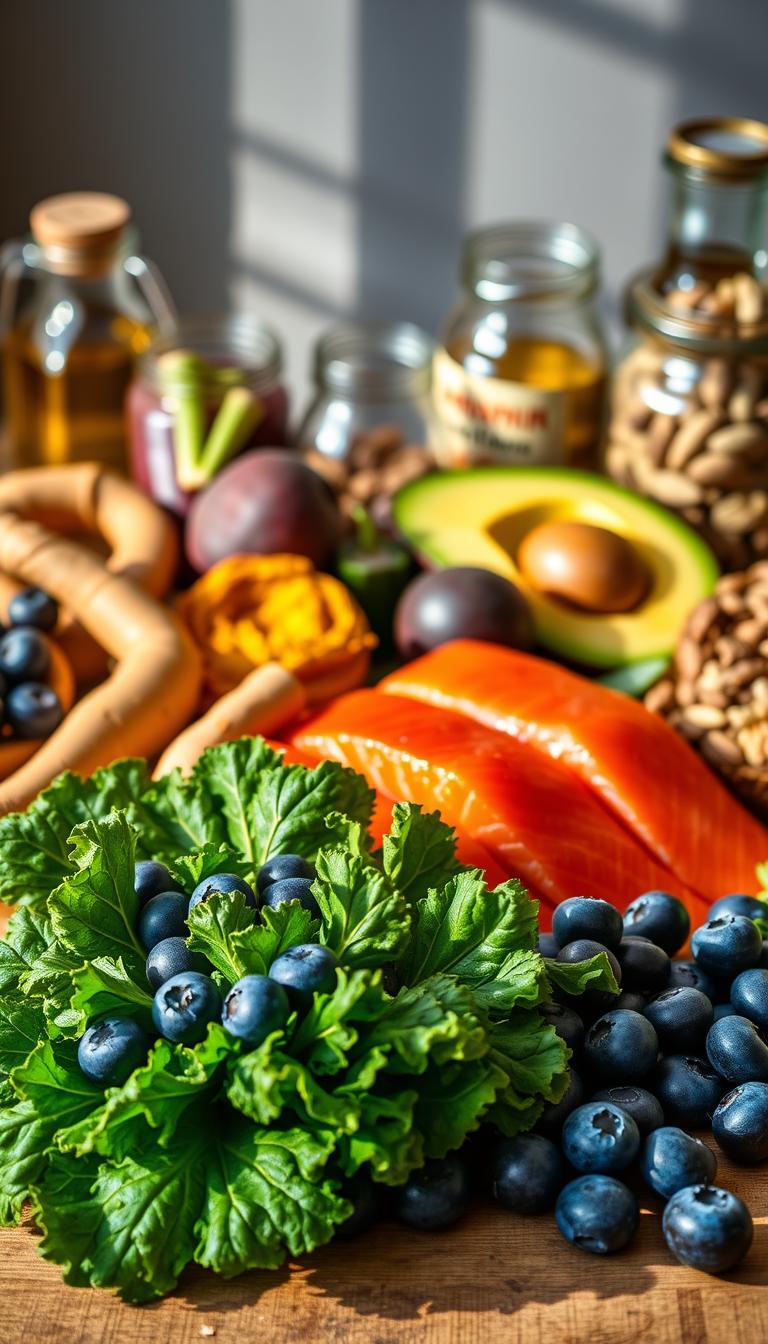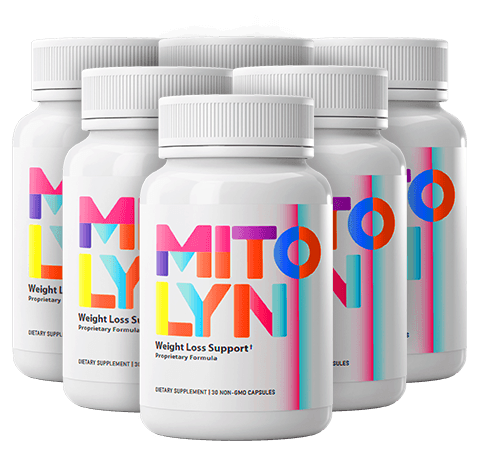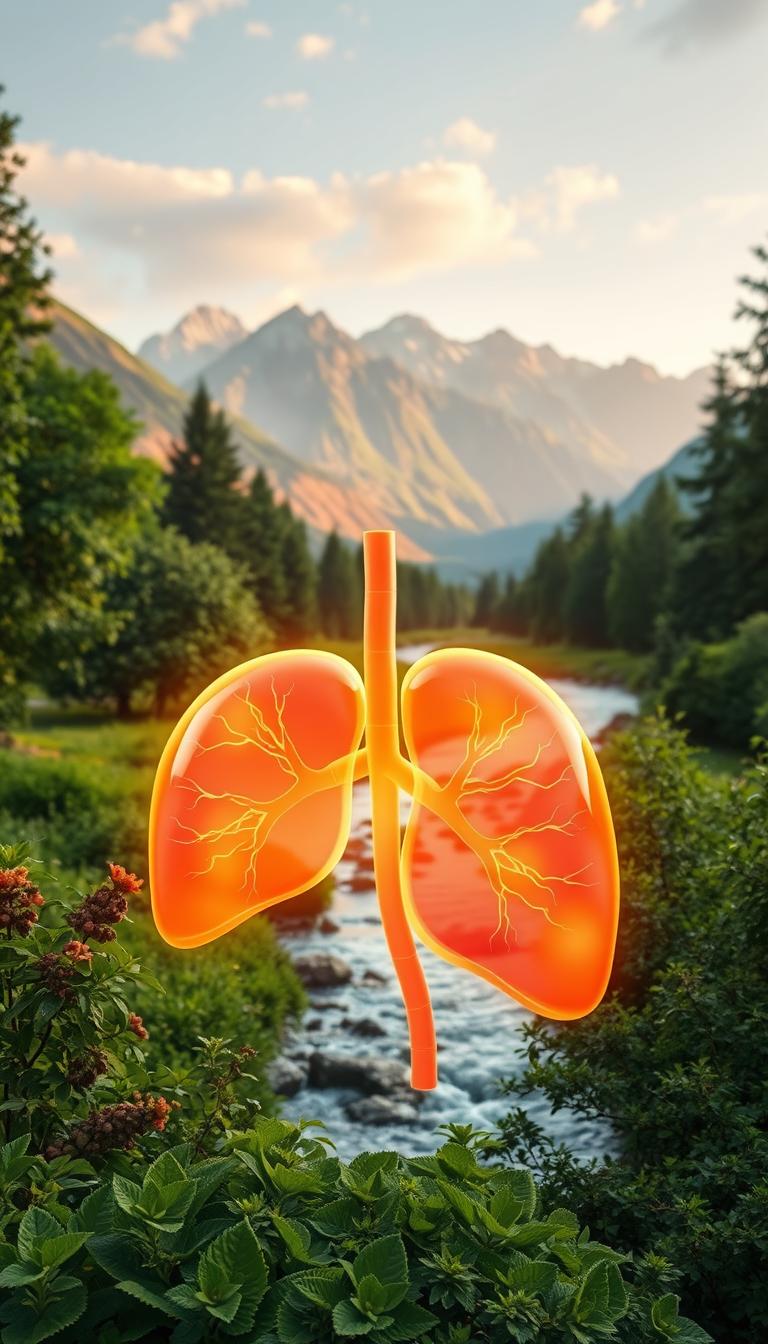
Your liver works all day, every day. It filters toxins, breaks down medicines, and keeps you healthy. It’s like your body’s unsung hero, doing over 500 jobs every day. But, many of us ignore its hard work until it’s too late.
Imagine if your body’s filter got blocked. That’s why taking care of a healthy liver is crucial. It’s not just a choice; it’s a must.
Key Takeaways
- Your liver does 500+ important jobs every day, like cleaning your blood and helping with digestion.
- Keeping your liver healthy can stop serious problems like cirrhosis or damage from hepatitis.
- Small changes, like drinking less alcohol or eating better, can help protect your liver over time.
- NAFLD, linked to being overweight, is becoming a big cause of liver disease. But losing weight can reverse the damage.
- Simple steps like drinking water, getting vaccinated, and going for regular check-ups can catch problems early.
Understanding the Importance of a Healthy Liver
Your liver is a powerhouse. It does over 500 things every day. It filters toxins and makes proteins. Without a healthy liver function, your body can’t handle medicines, store nutrients, or fight off infections well. Keeping your liver wellness in check is key for your health.
Key Functions of the Liver
- Filters toxins from blood
- Breaks down fats via bile production
- Stores vitamins, iron, and sugar
- Helps clot blood and manage cholesterol
How Liver Health Affects Overall Wellness
If your liver isn’t working right, you might feel tired or have stomach problems. You could also face serious health risks like liver disease. Over 100 million Americans have nonalcoholic fatty liver disease, which can get worse if not treated.
Poor liver wellness can also weaken your immune system. It might cause weight gain or make you feel foggy. Regular health checks and good habits can help avoid these problems.
“Your liver works tirelessly, but its health directly shapes your energy, digestion, and immunity.”
Think of your liver as your body’s protector. It keeps your cholesterol in check, helps with digestion, and keeps your energy up. Ignoring it can lead to more than just liver disease. It can affect how you feel every day. Taking small steps now can help protect your liver.
Common Liver Conditions and Their Effects
Keeping your liver health safe means knowing what can harm it. Fatty liver disease and hepatitis are two big problems. They can quietly damage your liver over time. It’s important to catch them early to prevent lasting harm.
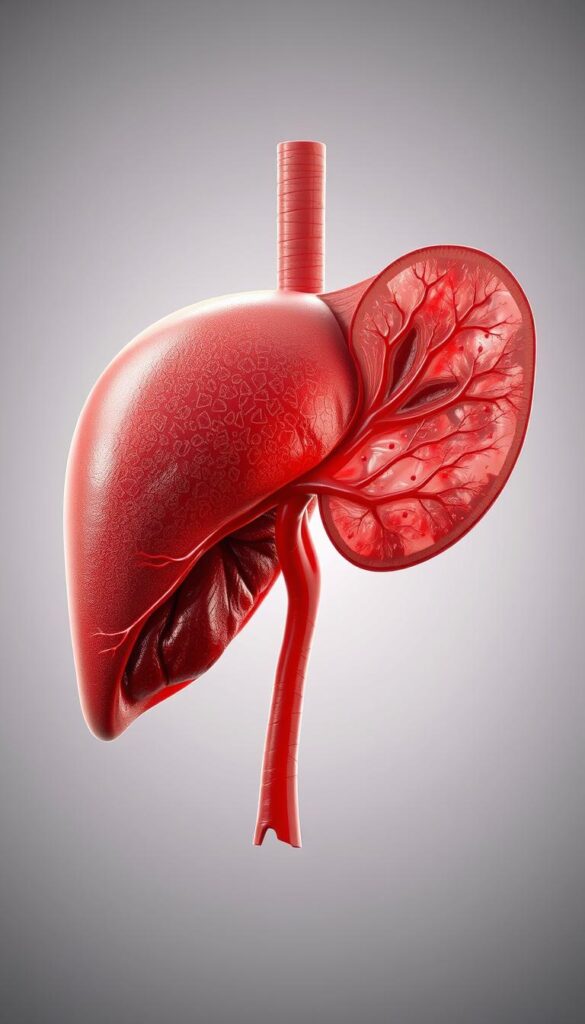
Fatty Liver Disease
Metabolic dysfunction-associated steatotic liver disease (MASLD) is now called NAFLD. It happens when fat builds up in liver cells. This is often linked to being overweight or having diabetes.
Without treatment, 1 in 3 people may get severe scarring (cirrhosis). Over 100 million Americans might have it without knowing. Key risk factors include:
- High sugar diets
- Lack of exercise
- Uncontrolled diabetes
Hepatitis Types and Their Impact
Viruses cause three major hepatitis types:
- Hepatitis A: Spread through contaminated food/water. Usually short-term but avoidable via vaccines.
- Hepatitis B: Transmitted through blood or bodily fluids. A vaccine exists, but chronic cases can lead to liver cancer.
- Hepatitis C: Blood-borne and once untreatable. Modern drugs cure 90% of cases today.
About 4.5 million Americans have chronic hepatitis, and 17,000 new cases of hepatitis C appear yearly.
Early symptoms like jaundice or fatigue are often ignored until damage is advanced. Regular check-ups and vaccines are your best defense against these threats to your liver health.
Signs Your Liver Needs Attention
Your liver works quietly, but ignoring its needs can harm your liver wellness. Early signs are often overlooked, yet catching them early matters most. Over 70% of those with liver disease don’t realize they’re at risk—so pay close attention to these clues:
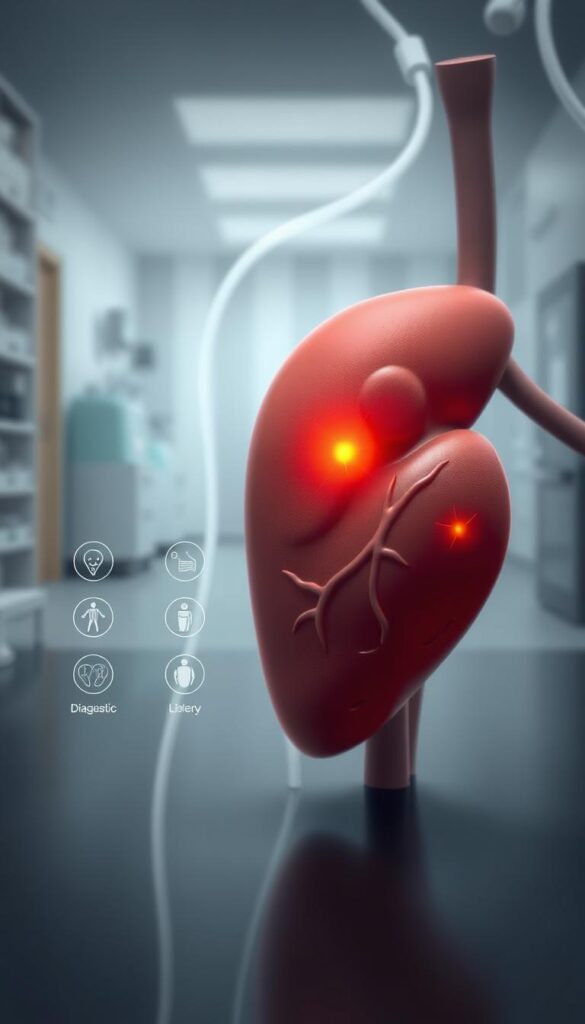
“If you experience three or more of these symptoms, it’s time to seek help,” advises Dr. Chris, whose viral TikTok on liver health reached 787,000 viewers.
Recognizing Early Symptoms
Early warnings include:
- Unexplained fatigue after restful sleep
- Stomach pain or nausea after fatty meals
- Dark circles under the eyes (due to poor detox)
- Swollen ankles or belly (fluid retention in 50% of cirrhosis cases)
When to Consult a Doctor
Seek immediate care if you notice:
- Yellow skin or eyes (jaundice)
- Severe abdominal pain or bloating
- Unexplained bruises or vomiting blood
Risk factors like heavy drinking, obesity, or family history of liver disease mean regular check-ups are vital. Even without symptoms, those with risk factors (e.g., tattoos from unregulated parlors, chronic meds) should get tested. Early action boosts recovery chances and supports long-term liver wellness.
Dietary Choices for a Healthy Liver
Your liver diet affects how well your healthy liver works. It deals with toxins, stores energy, and helps with metabolism. Making small changes in what you eat can help a lot.
Focus on foods that are good for your liver. These foods help it work better and reduce stress.
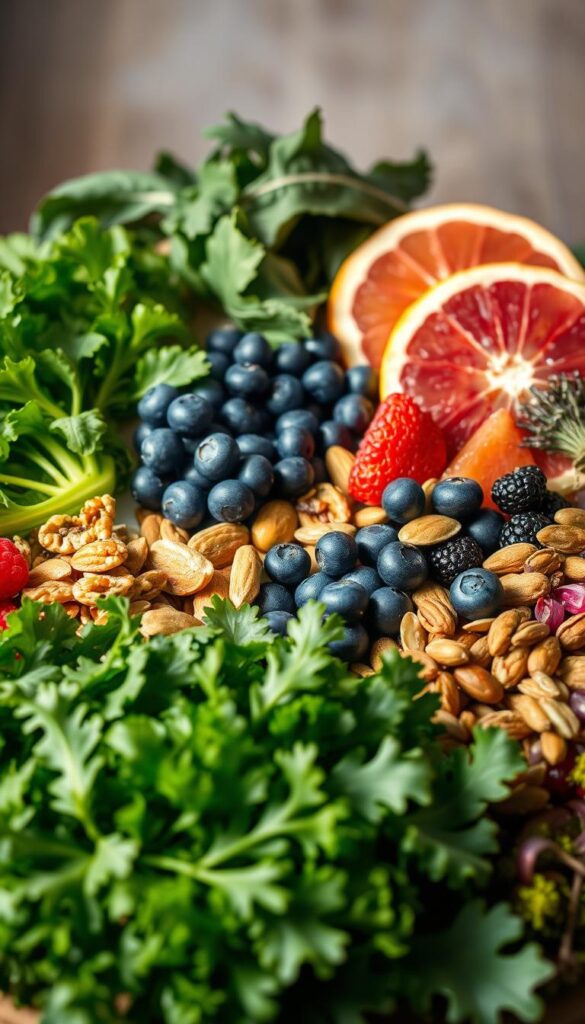
Foods to Include
Choose foods that are good for your liver:
- Fiber-rich options: Eat lots of spinach, apples, and oatmeal. Fiber helps control blood sugar and reduces fat. Oatmeal’s fiber can also help you lose weight, which is good for your liver.
- Healthy fats: Choose avocados, olive oil, and fatty fish like salmon. These fats are good for your liver and help fight inflammation.
- Antioxidant boosters: Blueberries, dark chocolate (in small amounts), and walnuts are full of antioxidants. These help protect your liver from damage.
- Coffee: Drinking 2–3 cups a day may protect your liver from harm caused by alcohol or bad eating.
Foods to Avoid
Stay away from foods that are hard on your liver:
- Refined carbs: Choose whole grains instead of white bread and sugary snacks. Refined sugars can raise blood sugar and increase the risk of liver disease.
- High-fat meals: Eat less fried foods and fast food. Too much fat can cause inflammation and scarring in your liver.
- Alcohol: Drink no more than 1 drink a day for women and 2 for men. Drinking too much can harm your liver’s detox process. Binge drinking (4+ drinks at once) is especially risky.
- Uncooked shellfish: Raw seafood can have bacteria that’s bad for a stressed liver.
Making small changes, like eating almonds instead of chips or grilling salmon, can make a big difference. Aim for balance to keep your liver healthy and working well.
The Role of Hydration in Liver Health
Did you know 43% of adults drink less than four cups of water daily? Hydration is key to keeping your liver working at its best. Your liver does over 500 tasks every day, like filtering toxins and processing nutrients. Water helps your liver flush out waste and keep liver function right.
Without enough water, dehydration can hurt your liver health. It makes it harder for your liver to process chemicals and fats.
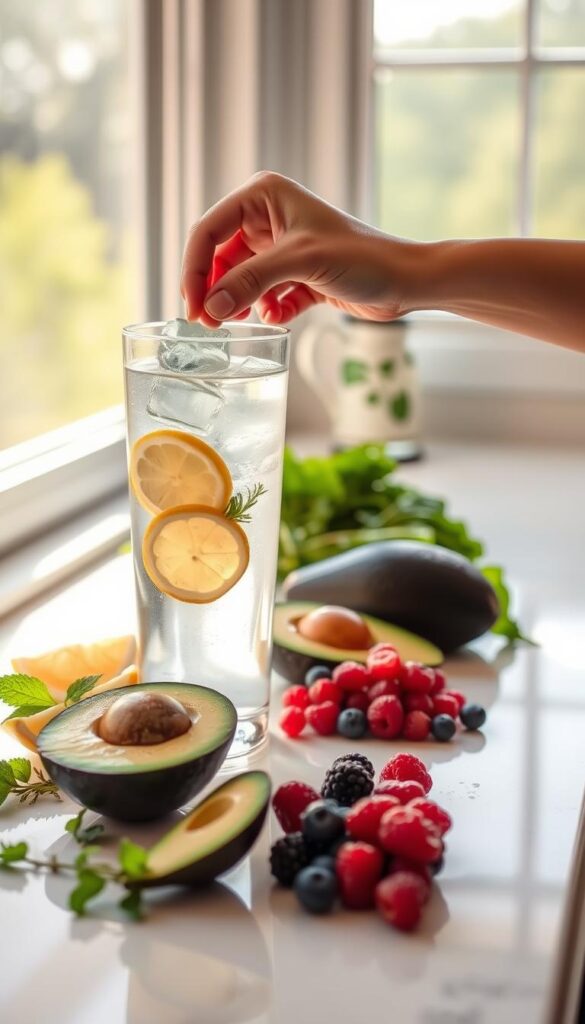
How Much Water Do You Need?
Aim for 8 cups (64 ounces) daily as a baseline. But your needs can change based on your body size, how active you are, and the weather. For example, athletes or those in hot weather might need more.
A study shows drinking enough plain water can lower the risk of fatty liver disease. Check your urine color: pale yellow means you’re hydrated; dark means you need to drink more.
Hydration Tips for Liver Function
- Start mornings with a glass of water to jumpstart your day.
- Add cucumber slices or berries to infuse flavor without sugar.
- Carry a reusable bottle to sip steadily throughout the day.
- Track intake using apps or marked bottles to stay on track.
Even small changes help. High-water foods like cucumber (96% water) or watermelon (92%) count toward your intake. Hydration makes blood thinner, helping your liver filter better. It also supports metabolism and reduces toxin buildup. Listen to your body—thirst is a sign to drink up!
Exercise and Its Benefits for the Liver
Moving your body regularly boosts liver wellness. It reduces harmful fat buildup and enhances metabolism. Research shows exercise lowers liver enzymes like ALT and AST. It also improves how your body uses insulin.
A study in the Journal of Hepatology found that diet and exercise together cut liver fat. This was in patients with metabolic conditions.

“Exercise improves liver health by reducing inflammation and aiding in weight management,” says the American College of Sports Medicine. “Even small activity changes can make a big difference.”
Recommended Activities
Choose exercises that fit your lifestyle. Aim for a mix of activities that:
| Exercise Type | Key Benefits | Examples |
|---|---|---|
| Aerobic Exercise | Lowers ALT levels, improves blood flow | Walking, swimming, cycling |
| Resistance Training | Reduces AST levels, builds muscle | Bodyweight exercises, light weights |
Creating a Fitness Routine
Start slow and build momentum. Try these steps to stay on track:
- Begin with 150 minutes of weekly moderate exercise (e.g., 30 minutes 5x/week)
- Add 2 weekly strength sessions using bands or bodyweight
- Track progress with a fitness app or calendar
Aim for consistency, not perfection. Even 10-minute walks count! Over time, this routine can reduce liver fat and lower cancer risk by up to 60%, per clinical studies. Pair activity with a balanced diet to maximize liver wellness.
Supplements That Support Liver Function
Looking into liver supplements needs careful thought. Products like milk thistle and turmeric are popular for liver support. But, the science behind them is not always clear.
Milk thistle might help with inflammation, studies suggest. Yet, most research is on animals. Turmeric looks promising in lab tests, but we need more human studies.
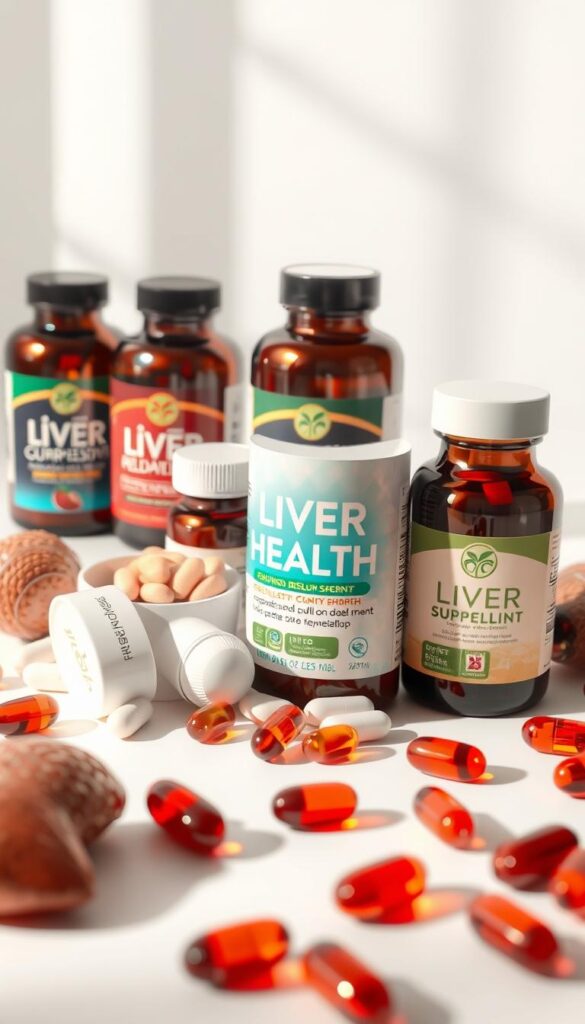
Popular Liver Supplements Options
- Milk Thistle: Silymarin extract may aid detox pathways, though evidence is strongest in animal studies.
- Vitamin E: Small trials in children with NASH showed ALT reductions, but adult studies often show mixed outcomes. A 2022 trial found no survival benefit in cirrhosis patients.
- Zinc: Animal research highlights its role in blocking oxidative damage from alcohol, but human applications need more study.
“No liver supplement can replace medical care for serious conditions like cirrhosis.”
Consult Professionals Before Starting Supplements
Over 38% of Americans use complementary therapies. Yet, 22% of liver patients take supplements without advice. Always talk to a registered dietitian or hepatologist before starting.
Ask these questions:
- Does this interact with my medications?
- Are there peer-reviewed studies on this compound?
- Does this brand use third-party lab testing?
Malnutrition affects 90% of advanced liver disease patients. Personalized guidance is key. Supplements labels aren’t always right. Seek advice from providers certified by the Commission on Dietetic Registration.
Reducing Alcohol Consumption for Liver Health
Protecting your liver health starts with knowing how alcohol hurts your body. Even a little can cause lasting damage. For example, just four ounces of hard liquor daily for men—or two for women—can scar liver tissue over time. Cutting back isn’t just about avoiding severe disease; it’s a step toward a healthy liver and better overall wellness.
Understanding Alcohol’s Impact
“70% of those with alcohol-related liver disease struggle with alcohol dependency.”
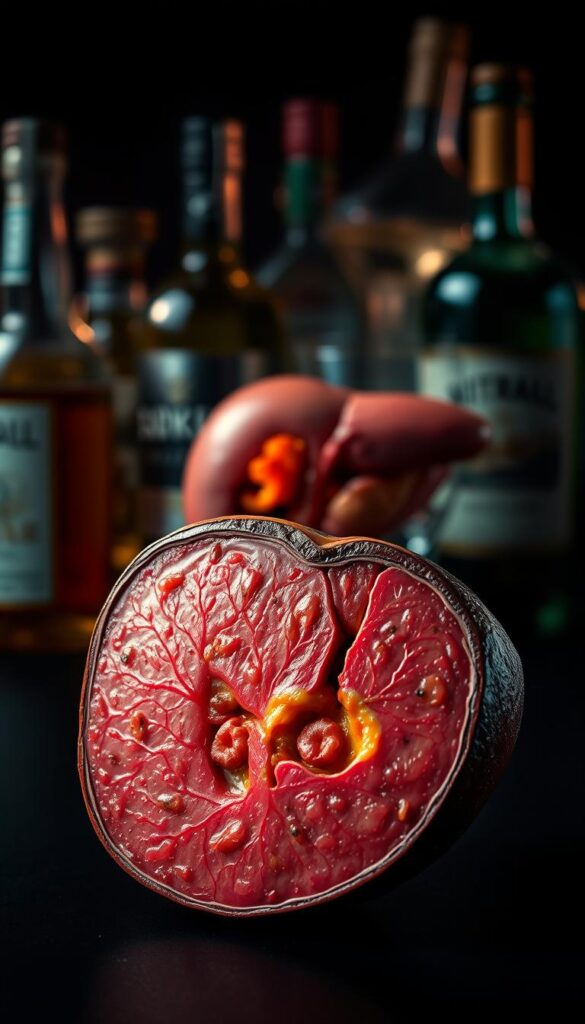
When you drink, your liver works hard to process alcohol, creating harmful byproducts. Over time, this leads to fatty liver disease, hepatitis, or cirrhosis. The liver can start healing within weeks of stopping, but scarring may become permanent if ignored. For those with advanced disease, stopping drinking entirely is critical to survival.
Strategies to Cut Back
- Track intake: Use apps to monitor daily drinks. A 175ml glass of 13% wine equals 2.5 units.
- Set limits: Follow guidelines—men: ≤3 drinks/day; women: ≤2. Take 3 alcohol-free days weekly.
- Swap choices: Alternate alcoholic drinks with water or mocktails.
- Seek support: Join groups like Alcoholics Anonymous or consult a healthcare provider for personalized plans.
Recovery begins quickly. Within weeks, liver cells can regenerate, reducing inflammation and scarring. Small steps, like replacing one drink with water, can make a big difference. Prioritize your liver health—your body’s ability to heal is your best ally.
Stress Management Techniques
Managing stress is crucial for liver wellness and keeping liver function healthy. Too much stress can cause inflammation and mess up how your body works. This can make liver problems like fatty liver disease worse. Simple steps can help you handle stress and keep your liver in good shape.
Mindfulness and Relaxation
Stress hormones like cortisol can harm your liver by causing inflammation and making it harder for your body to use insulin. Mindfulness can help reduce these negative effects:
- Deep breathing exercises: Spend 5 minutes daily focusing on slow breaths to lower stress hormones.
- Meditation: Even 10 minutes of guided sessions can reduce liver-damaging inflammation.
- Progressive muscle relaxation: Tense and release muscles to calm both body and liver stress responses.

Physical Activities for Stress Relief
Yoga or tai chi can help reduce stress and also benefit your liver. These activities improve blood flow and help reduce liver fat:
- Walking: 30 minutes daily improves insulin sensitivity and liver enzyme levels.
- Yoga: Poses like child’s pose or cat-cow enhance detoxification and lower stress.
- Gardening: Outdoor activities combine sunlight exposure with light exercise to ease stress and support metabolic health.
Find activities you like—like walking with friends or dancing—to make stress relief a habit. Taking these steps helps your liver stay strong against everyday stress.
Regular Health Check-Ups for Early Detection
Protecting your liver health starts with knowing your risk. Even if you feel fine, hidden issues like hepatitis or fatty liver disease might exist. Regular tests can catch problems before they worsen.
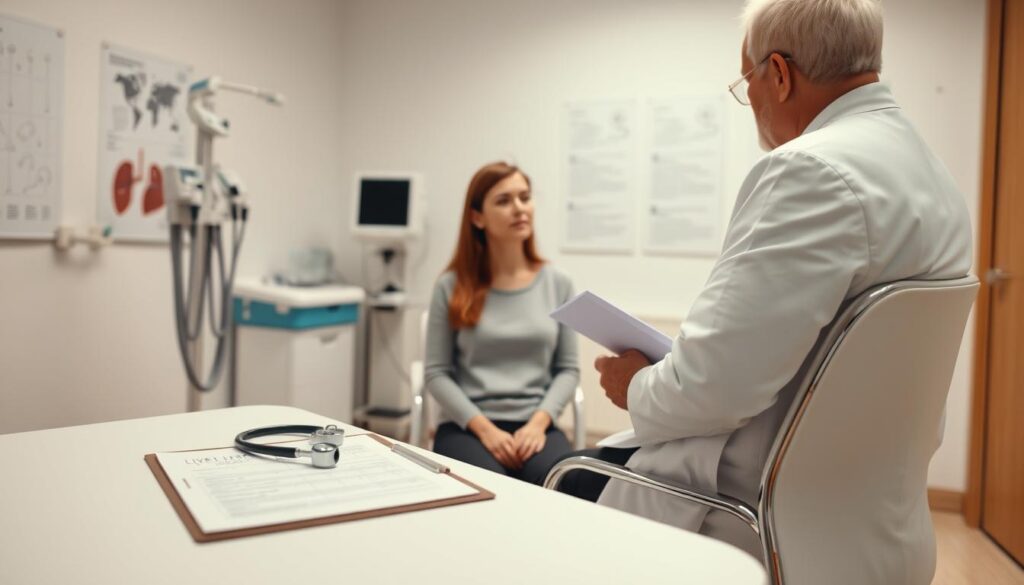
Recommended Tests for Liver Health
Doctors use blood tests and imaging to assess your liver’s condition. Key tests include:
- ALT/AST: Enzymes rising above 55 U/L/48 U/L may signal damage.
- Bilirubin: Levels over 1.2 mg/dL could point to bile blockages or liver failure.
- Albumin: Below 3.5 g/dL might mean your liver isn’t making proteins properly.
- Ultrasound or FibroScan: Non-invasive imaging to check for scarring or tumors.
- AFP test: Monitors for liver cancer risks.
Importance of Routine Screenings
Risk factors like obesity, family history, or heavy drinking mean screenings are vital. Many with hepatitis C don’t know they’re infected—early testing saves lives. Ask your doctor about:
“Screening is your first line of defense. Don’t wait for symptoms—act now.” — American Liver Foundation
Tests can reveal issues like inflammation or blockages. Even if results are abnormal, follow-up steps like lifestyle changes or treatments can prevent severe damage. Work with your provider to decide how often you need check-ups. Small steps today can lead to big gains in long-term liver health.
Incorporating Lifestyle Changes for Long-Term Health
Supporting your liver starts with small, lasting choices. While many products claim to detox or cleanse your liver, your body can do it naturally. Focus on habits that help your body process toxins better.
Setting Achievable Goals
Studies show losing 7–10% of body weight can help your liver. Start with small steps like drinking water instead of sugary drinks. Add a 20-minute walk each day.
Use tools like the M30® test to track your progress. This test measures liver cell damage. Small changes can make a big difference over time.
Building a Support System
Surround yourself with people who support your health goals. Talk to registered dietitians or join online groups focused on NAFLD management. Sharing your goals with friends or family can help you stay on track.
Studies show 68% of patients kept healthy habits with support. If you’re struggling, look for support groups for nutrition or exercise. These groups offer encouragement when you face challenges.
Your liver benefits from consistent habits. Eat whole foods, stay active, and get regular check-ups. Avoid unproven liver detox diets and supplements. By following science-backed practices, you build a strong foundation for your liver’s health. Every small step you take brings you closer to better health and reduces liver disease risks. Start with one change and keep going.




